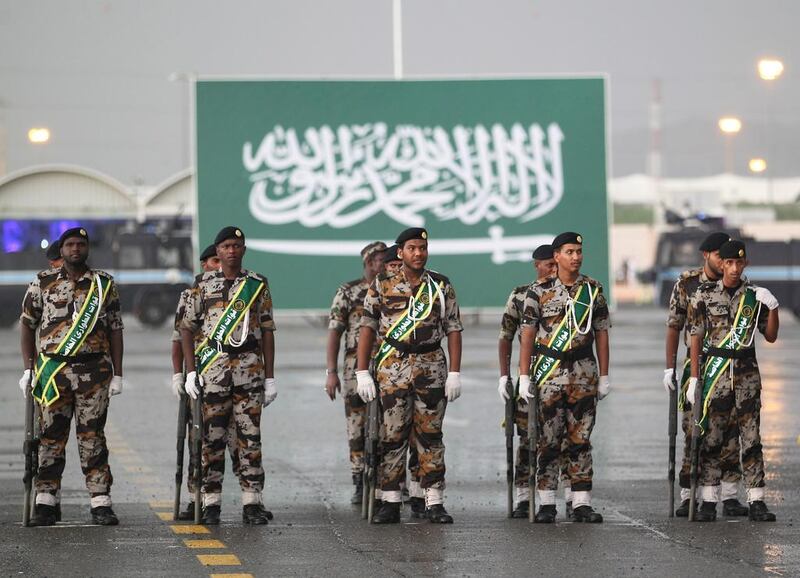Abu Dhabi // Military forces from 20 members of the Saudi-led anti-terrorism coalition have begun arriving in the kingdom for what Riyadh said will be the largest joint military exercises ever conducted in the region.
The Ra’ad Al Shamal – Northern Thunder – exercises were announced by the official Saudi Press Agency on Sunday, and described as a “clear message” that the coalition of Muslim-majority countries from Africa and the wider Middle East “stand united in confronting all challenges and preserving peace and stability in the region”.
It said the exercises would be the largest ever held in the region based on the number of participants and equipment and systems involved, and that they would include ground, naval and air forces. They will be held in the kingdom’s Northern Province and conclude on March 10.
The GCC countries and their joint Peninsula Shield force will take part, as well as troops from countries including Egypt, Jordan, Pakistan, Sudan, Malaysia, Morocco and Tunisia. Not all of the countries sent military units, with some only sending officers to observe, according to a Saudi source familiar with the planning.
Given their scale, planning for the exercises likely began in December, soon after the Saudi deputy crown prince and defence minister Mohammed bin Salman announced the formation of the coalition to fight extremist groups across the region. However, their timing concides with indications by Saudi Arabia and other Gulf countries that they would be willing to contribute ground forces to the fight against ISIL in Syria, in coordination with the United States. Special forces exercises will be a central component of Northern Thunder, and those from Gulf states that would be sent into Syria will likely be drawn from units that take part, the Saudi source said.
“My understanding is it is to test the capacity to work together on joint operations in the context of the recently announced anti-terror alliance,” said Faisal bin Farhan Al Saud, a Riyadh-based defence sector executive. “I expect the exercise to have multiple scenarios, including conventional large-scale infantry operations as well as special forces and low-intensity urban combat.”
Over the weekend, Riyadh said it had sent fighter jets to Incirlik airbase in southern Turkey to increase its role in the US-led air campaign against ISIL.
But the exercises also come amid growing frustration in Riyadh and among other US allies in the Middle East over the failure of US-led negotiations on Syria as the war there has tilted in the regime’s favour following direct Russian military involvement on its behalf. The US allies fear that one outcome of the focus on crushing the mainstream rebels by the Iranian-led ground forces and Russian bombs will be the strengthening of extremist groups such as ISIL.
Northern Thunder is intended to send a number of messages to rivals in the region such as Iran and to allies in the West, particularly the United States, observers said.
“I believe the message they are sending to Washington is, ‘we are still willing to trust you and work with you but at the same time we are prepared to go on our own if need be’,” said Riad Kahwaji, chief executive of the Dubai-based Inegma defence and security consultancy. While the Saudi foreign minister made clear on Sunday that special forces would only go into Syria to fight ISIL as part of a US-led strategy, Mr Kahwaji said the anti-terrorism coalition was not focused solely on ISIL in Syria, but is meant to be a force with a regional scope. “I would not underestimate their resolve and seriousness on how far they’re willing to go to protect their own interests”, Mr Kahwaji said of Riyadh.
The massive exercises are designed to show that the Saudi-led alliance is not just symbolic but it is working to build its military capabilities and the nuts-and-bolts capacities such as command and control, the integration of defence systems and the logistics of moving troops and materiel.
“The ability of these partner nations to work together and organise a large-scale military operation is the primary message,” Mr Al Saud said. “Many have expressed doubts about the anti-terror coalition announced by KSA and I think this is meant to show they are serious and that they are willing and able to work independently.”
He added: “I would also say there is a message to extremist groups that these nations have had enough of their hijacking of Islam and that they can no longer [pretend] their fight is with the ‘infidel’.”
Northern Thunder also demonstrates that despite the Saudi-led intervention in Yemen, Riyadh is capable of another major military deployment, albeit exercises, simultaneously. “Conducting a large-scale exercise is a very demanding endeavour, [and] considering some of the misconceptions about Saudi force size and capabilities, conducting it at the same time as a major military operation is significant,” Mr Al Saud said.
While Moscow has strained its relations with Gulf countries over its alliance with Tehran in Syria, Russia is becoming a more significant player in the region as it tries to fill a perceived vacuum left by a scaled-back US role, and has attempted diplomatic outreach to Gulf countries in particular with the message of shared interests. The message to Moscow that the exercises hold, said Mr Al Saud, is “perhaps to say if Russia is serious about fighting IS rather than using them as an excuse to achieve political objectives then they have a potential partner”.
foreign.desk@thenational.ae





